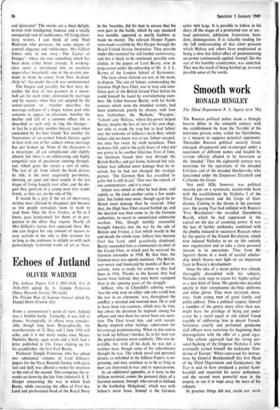Echoes of Jutland
OLIVER WARNER
The Private War of Seaman Stumpf edited by Daniel Horn (Frewin 42s) From a commentator's point of view, Jutland was a fruitful battle. Tactically, it was full of drama. Strategically, its effects were consider- able, though long term. Biographically, the reverberations of 31 May and 1 June 1916 still echo, and it is not many weeks since Master Nicholas Beatty, aged seven and a half, had a letter published in The Times sticking up for his grandfather, the first Earl Beatty.
Professor Temple Patterson, who has edited two substantial volumes of Lord Jellicoe's papers for the Navy Records Society with great tact and skill, was offered a rocket for insertion at the end of the second. This comprises the re- marks set down by the late Vice-Admiral J. E. T. Harper concerning the way in which Earl Beatty, while exercising the office of First Sea Lord and professional head of the Royal Navy in the 'twenties, did his best to ensure that his own part in the battle, which by any standard was notable, appeared as nearly faultless as made no matter. The relevant Harper Papers were made available by Mrs Harper through the Royal United Service Institution. They provide tinder-like material for still further controversy, and this is likely to be continued, possibly con- cluded, in the papers of Lord Beatty, now in preparation under the editorship of Mr A. J. L. Barnes of the London School of Economics.
The facts about Jutland are not, in the main, in dispute. The aim of Scheer, commanding the German High Seas Fleet, was to trap and anni- hilate part of the British Grand Fleet before he could himself be faced by overwhelming num- bers. He failed because Beatty, with his battle cruisers which were the intended victims, had been reinforced, purely by chance, with four new battleships, the 'Barham,' Warspite,' 'Valiant' and 'Malaya,' whose fire-power helped Beatty, despite the loss of two of his own ships, not only to evade the trap but to lead Scheer into the welcome of Jellicoe's main fleet, which Scheer did not know was at sea. Scheer escaped, not once but twice, by swift turnabout. Then darkness fell, and in the early hours of what did • not prove to be another Glorious First of June, the Germans forced their way through the British flotillas and got home, battered but safe. Scheer had inflicted more damage than he re- ceived, but he had not changed the strategic picture. 'The German fleet has assaulted its jailor but is still in jail' That was the remark of one commentator, and it is exact.
Scheer was elated at what he had done, and rightly so. He tried another sortie a few weeks later, but failed once more, though again he in- flicted more damage than he received. After that, the High Seas Fleet stayed,bottled up, and the decision was then come to, by the German authorities, to resort to unrestricted submarine warfare. This, though terribly successful, brought America into the war by the side of Britain and France, a fact which would in the end decide the whole issue. Jellicoe later became First Sea Lord, until gracelessly. dismissed. Beatty succeeded him as commander-in-chief of the Grand Fleet, in which post he received the German surrender in 1918. By that time, the German navy was openly mutinous. The British, war-weary and frustrated by months of fleet in- activity, were as ready for action as they had, been in 1916. Thanks to the lessons they had learnt from Jutland, they were better equipped than in the opening years of the struggle.
Jellicoe, who in Churchill's echoing words 'was the only man on either side who could lose the war in an afternoon,' was, throughout the conflict, a strained and worried man. He is said to have been too cautious, which may be true, but about the devotion he inspired among his officers and men there has never been any ques- tion. The Fleet loved him, and with reason. Beatty inspired other feelings, admiration for his courage predominating. When in due course he took up Jellicoe's burden, he in his turn saw the general picture more sombrely. This was in- evitable, for, with all his dash, he was not a reckless man, though some of his subordinates thought he was. The whole naval and personal drama, as unfolded in the Jellicoe Papers, is en- grossing, and may continue so to be as long as men are interested in war and its repercussions.
As an additional appendix, as it were, to the Jellicoe material, comes the personal diary of a German seaman, Stumpf, who served at Jutland in the battleship 'Helgoland,' which was with Scheer's main force. Stumpf is the German sailor writ large. It is possible to follow in his diary all the stages of a protracted war at sea: loud patriotism, jubilation, frustration, bore- dom, disintegration. It is valuable reading for the full understanding of that silent pressure which' Mahan and others have emphasised as being a slow but lethal effect of predominating sea power continuously applied. Stumpf, like the rest of his humbler countrymen, was underfed. That was the result of being bottled up, in every possible sense of the words.


































 Previous page
Previous page